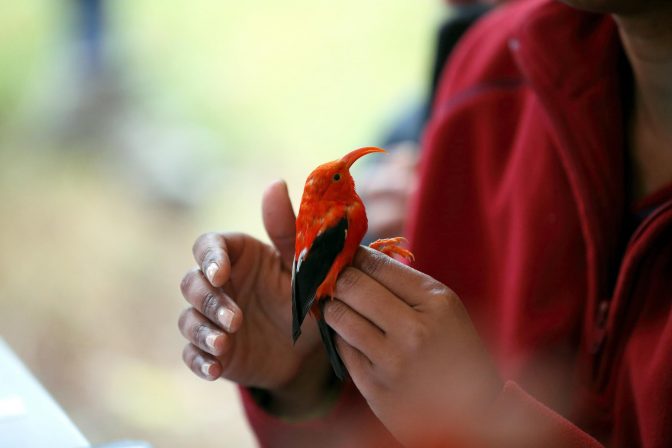By Staff Reports
(Hawaii)– A local tour company with a strong conservation mission,Hawaii Forest & Trail, has donated $25,000 to the University of Hawai‘i at Hilo Biology Department to support research and technologies to reduce mosquito populations and suppress the spread of avian diseases in Hawai‘i.
“I believe we are getting very close to actually having the technology to save many of our remaining Hawaiian forest birds. Gifts such as this are critically important to providing the resources to make this a reality,” said Patrick J. Hart, UH Hilo chair and professor of biology.
Beautiful and diverse groups of birds endangered
Nearly six million years ago, a small flock of finches arrived in the Hawaiian Islands and evolved into at least 55 species of birds known as the Hawaiian honeycreepers. They are among the most beautiful and diverse groups of birds in the world, and also the most threatened. Over half have become extinct since human arrival to the islands over 1,000 years ago, and of those remaining, more than half are endangered.
The primary reason for the continued decline of honeycreepers is mosquito-transmitted diseases such as avian malaria and avian pox. Climate change is exacerbating the problem, and mosquitoes are beginning to move up in elevation to the last disease-free habitats on all Hawai‘i islands.
Effective strategy to save the birds
In 2016, local, national and international experts gathered to discuss how to eliminate mosquito-transmitted diseases from Hawai‘i. One strategy considered favorable in terms of its effectiveness, technical readiness and safety, was the release of male mosquitoes carrying the bacterium Wolbachia.
Wolbachia bacteria naturally occur in approximately 50 percent of insect species, including native Hawaiian insects. These bacteria are harmless to humans and birds, because they only survive within insect cells. Mosquito suppression can be achieved by introducing different strains of Wolbachia into mosquitoes, because matings between male and female mosquitoes that have different strains of Wolbachia fail to produce living embryos. Wolbachia male-based insect control programs have been highly successful for reducing local mosquito populations around the world.
“The ultimate goal is to be able to release male mosquitoes with a different Wolbachia strain into the wild to mate with wild females, to suppress mosquito populations. None of the mosquitoes here are native to Hawai‘i. If we can reduce or even eliminate mosquito populations in Hawai‘i, we have a good chance of saving many iconic bird species,” said Jolene Sutton, UH Hilo assistant professor of biology. “Our research focuses on evaluating and developing novel strategies for mosquito control, including Wolbachia-based strategies and genetic ones. We want to ensure that new technologies are safe and effective. This donation will go a long way to help further this work. We are very grateful to have this kind of local interest and support.”
Local efforts to develop Wolbachia male-based mosquito control
Working together, UH Hilo and UH Mānoa are developing local Wolbachia technologies and action plans to reduce mosquito populations and suppress the spread of avian diseases in Hawai‘i. Much of this work is being conducted in a newly renovated biosafety level II lab at UH Hilo that is currently devoted entirely to mosquito control research.
Rob Pacheco, founder and president of Hawaii Forest & Trail said, “Conservation and sustainability are the foundational philosophies at Hawaii Forest & Trail. Last year, the company celebrated 25 years and established the I‘iwi Fund, a dream my wife, Cindy, and I have shared for a long time. The I‘iwi Fund offers guests aboard Hawaii Forest & Trail adventures the opportunity to contribute and is donor-directed and administered by the Hawai‘i Community Foundation.”
Pacheco continued, “Hawaii Forest & Trail was so honored to donate the I‘iwi Fund gift to the UH Hilo Biology Department. It’s our hope that through this donation important research work will continue to make strides in protecting Hawaiian forest birds, including our much-loved I‘iwi.”
If you would like to support the efforts to save Hawai‘i’s birds, please make a gift
www.uhfoundation.org/

